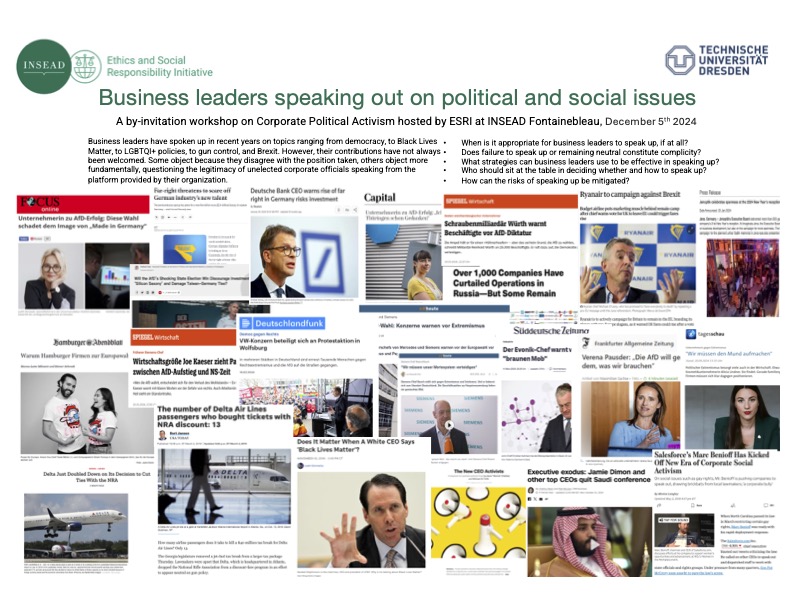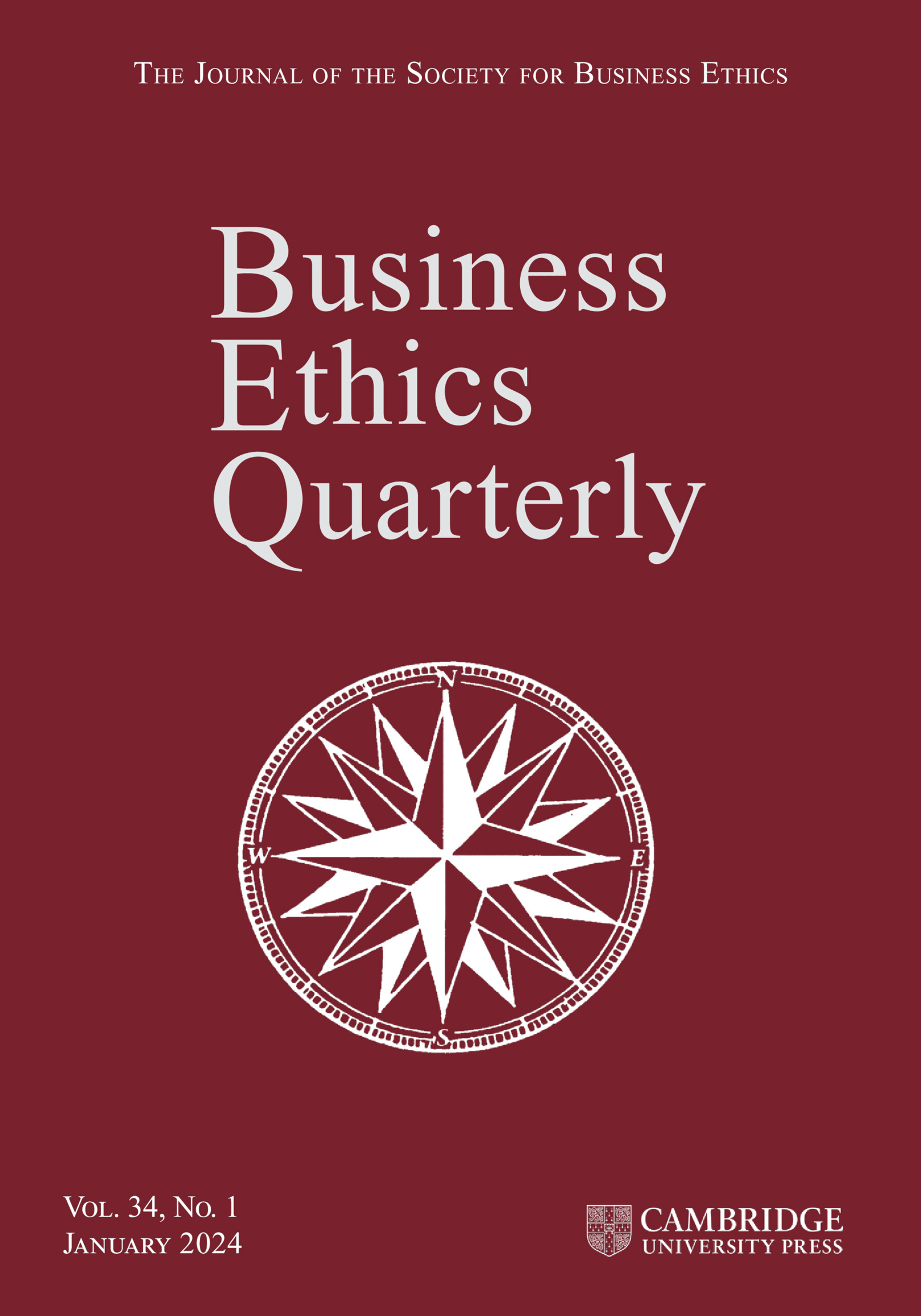ESRI Signature Event
When Should Business Speak Out on Political and Social Issues?
By-Invitation Workshop on Corporate Political Activism
Earlier this year, Christian Sewing, CEO of Deutsche Bank, chose the bank’s annual reception in Berlin to speak out about the threat right-wing extremism poses for the bank’s investors. Stefan Traeger, CEO of Jenoptik, has asserted his hope for an "open, free and democratic" country, saying "That’s what we need in order to move the company forward.” Numerous companies and their CEOs in Germany have also recently stepped forward to raise their concerns as well. They see the negative impacts that the proposed policies of right-wing movements and parties—relating to immigration, the European Union and man-made climate change—could have for the German economy.
While the threat posed to business—if not democracy—is acute, this is not the only issue that has prompted business leaders to speak up in recent years, with topics ranging from Black Lives Matter, to LGBTQI+ policies, to gun control, and Brexit. However, their contributions have not always been welcomed. Some object because they disagree with the position taken, others object more fundamentally, questioning the legitimacy of unelected corporate officials speaking from the platform provided by their organization.
When is it appropriate for business leaders to speak up, if at all? Does failure to speak up or remaining neutral constitute complicity? What strategies can business leaders use to be effective in speaking up? Who should sit at the table in deciding whether and how to speak up? How can the risks of speaking up be mitigated?
This exclusive workshop of 50 leading thinkers and practitioners, together with INSEAD faculty, will examine these questions in depth, drawing on insights from business leaders as well as civil society and academic researchers. Its purpose is to generate ideas for further research and guidance for practice.
We intend to give particular attention in the first part of the day to the situation in Germany. Our opening keynote speaker, Stefan Traeger, CEO of Jenoptik, is one of several German business leaders who have spoken up about the threats posed to business and society by the rise of the extreme right in Germany. He will explain why and how he has spoken up.
A panel comprised of businesspeople and related stakeholders (e.g., board member and union representative) will follow our keynote and further explore the German example. Following that, a second practitioner panel will explore the issue in other contexts and geographies, including Europe and the U.S. during the recent election. With the stage set in this way, the subsequent academic speakers and panellists will explore the implications for research and practice of the examples discussed and include presentations of research on corporate political activism.
Programme: Thursday, December 5th, 2024
at INSEAD Fontainebleau (amphi S, Le Cercle)
08:30 – 09:00 Registration and Refreshments
09:00 - 09:15 Welcome and Introduction to the Workshop
- Francisco Veloso, Dean of INSEAD
- N. Craig Smith, INSEAD
- Markus Scholz, TU Dresden
09:15 – 09:45 Opening Keynote Address
- Stefan Traeger, CEO, Jenoptik
09:45 - 10:45 Business and the Rise of the Extreme Right in Germany (Panel I)
- Matthias Diermeier, German Economic Institute
- Martin Fischer, Celanese
- Britta Jacob, Democratic Strategy Initiative
- Maxi Leuchters, Commerzbank AG
- Stefan Traeger, Jenoptik
- Markus Scholz, TU Dresden (Moderator)
10:45 – 11:15 BREAK
11:15 – 12:15 Business and Politics: International Perspectives (Panel II)
- Rana Islam, McKinsey
- Claudia Oeking, Airbus
- Eric Orts, Wharton
- Joe Zammit-Lucia, Radix
- N. Craig Smith, INSEAD (Moderator)
12:15 – 13:00 Current Research on Business and Politics: Directions and Gaps (Panel III)
- Zena Al-Esia, University of Bath
- Christopher Hartwell, ZHAW
- Andreas Scherer, University of Zurich
- Georg Wernicke, HEC
- Ilze Kivleniece, INSEAD (Moderator)
13:00 - 14:00 LUNCH
14:00 – 15:30 Research Presentations Session
- Matthias Diermeier, German Economic Institute: “Business and Populism in Germany: The End of Party-Political Neutrality?”
- Benedikt D. S. Kapteina, TU Dresden: “Business and Politics: Why Some German Companies Resist Right-Wing Populism”
- Daniel Nyberg, University of Queensland: “Decarbonization in an Era of Representative Crisis”
- Reilly Steel, Columbia Law School: “The Political Transformation of Corporate America”
- Dorothee Winkler, University of Zurich: “Robust CEO Activism: How Elon Musk Gained (and Lost) Two-Sided Alignment and Legitimacy in the Polarized US Media Landscape”
15:30 – 16:00 BREAK
16:00 – 17:15 Developing a Research Agenda on Business and Politics (Panel IV)
- Andrew Crane, University of Bath
- Patricia Crifo, Ecole Polytechnique
- Jonathan Doh, Villanova University
- Jean-Pascal Gond, Bayes Business School
- Arno Kourula, University of Amsterdam
- Dorothee Winkler, University of Zurich
- Douglas Webber, INSEAD (Moderator)
17:15 – 17:30 Concluding Remarks
- N. Craig Smith, INSEAD
- Markus Scholz, TU Dresden


Business and Politics Should Never Mix—Or Should They?
See INSEAD Knowledge article by Markus Scholz and Craig Smith
The Normativity Project
Do business researchers and businesses give sufficient attention to normative considerations? This project includes participation in a special issue for Business Ethics Quarterly.











